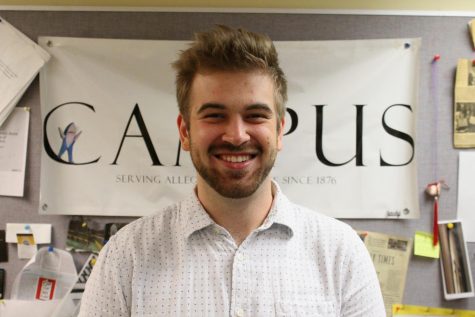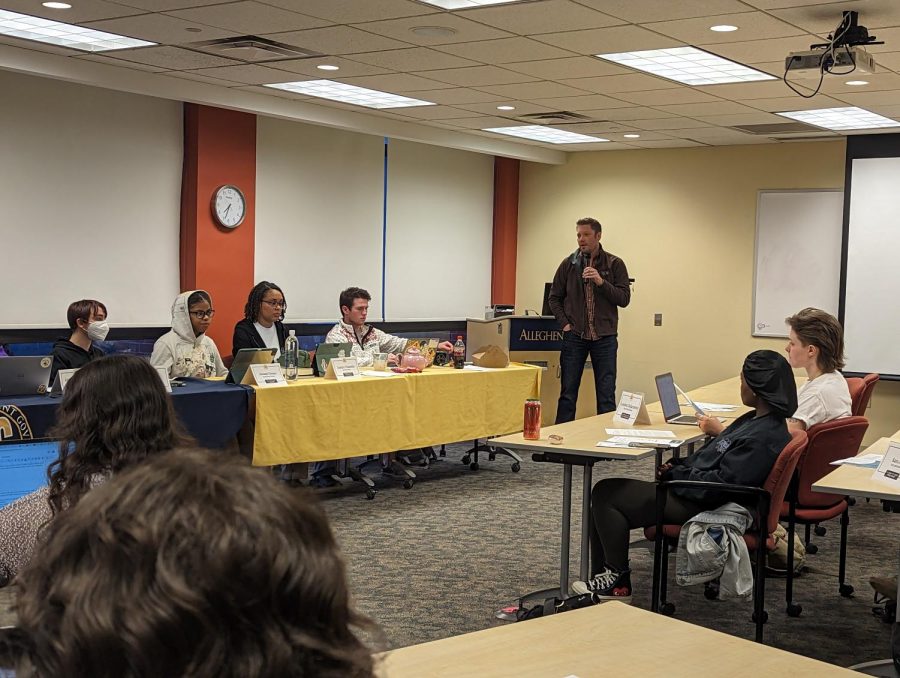ASG hosts CampusCare and Middle States guests
After a hiatus for the 2023-24 Allegheny Student Government Presidential Debate, the ASG Senate returned to room 301/302 of the Henderson Campus Center on Tuesday, March 21, with enough activity to fill the General Assembly-shaped hole left in constituents’ hearts.
ASG welcomed two guest speakers and heard from a constituent and former presidential candidate who brought what he saw as a shortcoming of the ASG bylaws to light.
Reece Smith, ’24, presented an amendment to Article I, Section 6, Subsection a.i.2 of the bylaws. Smith’s goal was to clarify the language of the constitution. It currently reads that candidates may not engage in “negative campaigning against other candidates.” Smith’s suggestion states that candidates may not engage in “attacking the character and motives of other candidates. This clause shall not be interpreted to prevent candidates from critiquing and debating other candidates’ platforms or policies.”
“Regarding this amendment, I don’t want people to see its connection to me,” Smith said regarding his removal from the ASG presidential race after the meeting. “What I know for sure is that it was communicated to me directly from ASG that candidates can be removed for critiquing others’ ideas. If that’s the case, it shouldn’t be the case. And I want to make that not the case.”
ASG officials questioned multiple aspects of Smith’s proposal. Director of Diversity and Inclusion Jaelyn Valentin, ’25, expressed concerns that Smith’s wording may give future candidates an opportunity to blur the lines between attacking their opponent’s character and critiquing their ideas. Director of Community Engagement William Lowthert, ’24, thought similarly, suggesting that critiques can be charged with undertones of attacks on a person’s identity.
Later in the discussion, Smith noted that ASG’s Rules Committee is already looking for similar infractions in campaigns currently, and that his proposal is not meant to allow for more “mudslinging,” but rather to allow for richer, more nuanced discussions through the campaigning process.
Amid the discussion, ASG President Veronica Green, ’23, made clear that the amendment was not sponsored by ASG and was not reviewed by the Rules Committee, meaning that it could not be voted on.
“I totally understand,” Smith responded. “I didn’t think as being not a senator that I was able to submit anything to rules to even be approved. Which is why I came right here to sort of say, ‘if anyone’s interested, here’s this thing that I wrote up if anyone’s interested in being its champion in the Senate.”
Green later made special note that should a senator choose to sponsor a version of Smith’s proposed amendment, questions like those posed at GA would become their responsibility to resolve.
Smith said after the meeting that he was unsure of how the proposal went.
“I’m going around at the beginning to senators and I’m like, ‘here’s this, here’s this, here’s this’ … I had basically bombarded them out of nowhere with this policy that is inextricably linked to my own personal life,” Smith said. “As much as I wish it wasn’t, it is.”
No matter the internal response, Smith said he would keep on lobbying ASG when he sees necessary — from outside the organization.
“I do not want to make my life working with ASG to do things,” Smith said. “I want to have the ability to go — if no one likes what I’m proposing, I can just walk away.”
Prior to Smith, ASG heard from two official guest speakers. The first was John Ingham, the vice president of CampusCare — the telehealth services organization with which Allegheny announced a partnership on Feb. 1. After reviewing all the opportunities available to Allegheny students through CampusCare, Ingham fielded questions from the assembly.
CampusCare’s primary appeal to students was counseling services, according to Green, and she asked Ingham what the capacity for therapy and counseling was. He replied that it is “very vast.”
“Nationwide, we have 30,000 therapists,” Ingham said. “And by the way, all of our clinicians are W-2 employees. So we don’t outsource, we don’t 1099 or anything like that … everybody’s employees of ours.”
Ingham said that students have the opportunity to choose which counselor they work with and will keep that counselor until they decide they would like a new one.
Valentin questioned how CampusCare would operate for students who leave the state for breaks, as therapists are only allowed to practice in the state in which their license is issued.
“We have licensed clinicians in all 50 states,” Ingham responded. “So if you go to Ohio or Alaska or Texas — it doesn’t matter where you’re going, as long as it’s in the 50 states. But it may be a different therapist as you move out.”
The other guest was Professor of History and Global Health and Co-Chair of the Middle States Reaccreditation Steering Committee Kenneth Pinnow, who provided a brief update on the Middle States process.
“As a reminder about the timeline, this has been going on for almost two years now,” Pinnow said. “We have been trying to be as open and inclusive and transparent as possible.”
Pinnow explained that the final draft of Allegheny’s self-study report was turned over to Middle States “about a month ago.” He specifically wanted to highlight that Middle States’ external review team would be arriving on campus on Sunday, March 26, and remain until Wednesday, March 29. An itinerary of the full visit is available on the college’s webpage for the Middle States process, though Pinnow explained that it is subject to change, and already has a number of times.
The two events Pinnow promoted were an interactive drop-in session with the reviewers in 301/302 on Monday, March 28, from 2 to 2:50 p.m., and the presentation of the reviewers’ preliminary findings in the Vukovich’s Gladys Mullenix Black Theatre on Wednesday, March 29, at 11 a.m.
The final decision on whether or not the college will be reaccredited will come in June.
“I think we will be,” Pinnow said to the assembly.
For Valentin’s cabinet report, she presented amendment 22-07 — a response to amendment 22-06, which successfully passed its first round of voting at the March 3 GA.
Amendment 22-07 places the power to determine Culture, Identity and Leadership Coalition status for clubs in the hands of CILC members. It also requires that current CILC organizations maintain the requirements of CILC laid out in the CILC constitution, rather than being permanently grandfathered in, as 22-06 suggests.
As 22-07 had not been presented to the Rules Committee, it was not up for vote, but the Senate was still able to vote on 22-06.
After a five-minute discussion, a motion to vote on 22-06 was raised, but did not pass.
In usual business, GA approved $8,017.50 in spending for the week, with $1,932.50 from the general fund going toward WARC, the African Student Association, and Pre-Health Club; and $6,085 from the CILC fund going toward International Club and Union Latinx.
During her report, Green noted that she will be meeting with Director of the Treasury Adrianna Solis, ’23, to “get financial information in a good position” before the presidential transition.
The meeting closed at 8:46 p.m.

Roman Hladio is a senior from Wexford, Pennsylvania. He is studying English with a creative writing emphasis, and completing requirements for a Journalism...









